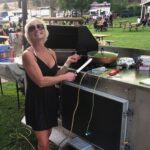A former street-level sex worker turned author is bringing Okanagan voices to the forefront with her new book, hoping to change perceptions about an often-misunderstood community.
April Eve Wiberg’s “Sacred: Stories from Canadian Sex Workers” hit shelves last week, featuring intimate accounts from individuals across the country, including several from the Okanagan region where Wiberg now calls home.
“These stories needed to be told by the people who actually lived them,” Wiberg told me during our meeting at a downtown Kelowna café. “For too long, others have spoken for sex workers without ever walking in their shoes.”
The book emerged from Wiberg’s own journey through trauma, addiction, and eventually, healing. After leaving sex work nearly 15 years ago, she founded the Stolen Sisters and Brothers Awareness Movement in Edmonton before relocating to the Okanagan in 2019.
What makes the collection particularly compelling is its regional perspective. While much media attention focuses on Vancouver’s Downtown Eastside, Wiberg’s work reveals the distinct challenges faced by sex workers in smaller communities like Vernon, Kelowna, and Penticton.
“Rural and suburban sex work looks different than in major urban centers,” explains Dr. Cecilia Benoit, a researcher from the University of Victoria who studies sex work in British Columbia. “There’s often less access to harm reduction services, greater isolation, and heightened stigma in smaller communities.”
According to statistics from PEERS Kelowna, a local outreach organization, approximately 200-300 individuals engage in various forms of sex work throughout the Okanagan Valley. The organization reports a 35% increase in requests for support services since the pandemic began.
The book’s release comes amid ongoing debates around Canada’s prostitution laws. The Protection of Communities and Exploited Persons Act, enacted in 2014, criminalized the purchasing of sexual services while decriminalizing the selling of such services – a model known as the “Nordic approach.”
Critics, including many featured in Wiberg’s book, argue this legislation has pushed sex work further underground, making it more dangerous. Advocacy groups like Pivot Legal Society have documented how criminalization forces workers to make quick decisions about clients, often sacrificing safety screening processes.
“When we’re treated as victims without agency or criminals without dignity, the real complexity of our lives gets erased,” says one Okanagan contributor identified only as Jasmine in the book.
What distinguishes Wiberg’s approach is her insistence on presenting unfiltered narratives that resist easy categorization. Some contributors describe entering sex work by choice, others through coercion or economic necessity. Their experiences range from empowering to traumatic, often within the same individual’s story.
“If we’re going to have honest conversations about sex work, we need to stop trying to fit everyone into the same box,” Wiberg explained. “Some people need exit supports, others need safer working conditions. The common denominator is dignity.”
Local community response has been mixed. While the Okanagan Regional Library has added copies to its collection, some community groups have expressed concern about the book’s approach. Pastor Michael Craig of Harvest Fellowship told me he worries the book might “normalize behaviors that harm women,” though he hadn’t yet read it.
Meanwhile, health outreach workers see value in the publication. “Anything that helps the public understand the full humanity of marginalized populations ultimately improves public health outcomes,” notes Terry Edwards, a nurse practitioner with Interior Health who specializes in harm reduction.
The book doesn’t shy away from difficult subjects, including violence, substance use, and trauma. However, it also captures moments of resilience, friendship, and profound personal transformation.
“I wanted to show the whole picture,” Wiberg said. “The darkness is real, but so is the light.”
For Okanagan readers, the collection offers rare insight into a world that exists alongside them but often remains invisible. Stories reference familiar locations – a particular stretch of highway, a now-closed motel, local service organizations – grounding abstract social issues in concrete local geography.
Wiberg will be hosting several reading events throughout the Valley in coming weeks, including at Mosaic Books in Kelowna on June 18th and the Vernon Public Library on June 25th. A portion of book proceeds will support outreach programs for current sex workers in the region.
“Whether you agree with sex work or not isn’t really the point,” Wiberg concluded. “These are our neighbors, and their stories matter. Sometimes just listening is the most radical act of compassion we can offer.”






